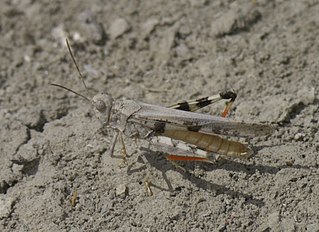Morsea islandica, the island monkey grasshopper, is a species of monkey grasshopper in the family Eumastacidae. It is found in North America.
Morsea is a genus of monkey grasshoppers in the family Eumastacidae. There are about seven described species in Morsea.
Morsea dumicola, the yavapai monkey grasshopper, is a species of monkey grasshopper in the family Eumastacidae. It is found in North America.
Psychomastax deserticola, the desert monkey grasshopper, is a species of monkey grasshopper in the family Eumastacidae. It is found in North America.
Psychomastax is a genus of monkey grasshoppers in the family Eumastacidae. There are at least four described species in Psychomastax.
Morsea californica, the chaparral monkey grasshopper, is a species of monkey grasshopper in the family Eumastacidae. It is found in North America.
Psychomastax robusta, the robust monkey grasshopper, is a species of monkey grasshopper in the family Eumastacidae. It is found in North America.
Psychomastax inyo, the White Mountain grasshopper, is a species of monkey grasshopper in the family Eumastacidae. It is found in North America.
Morsea tamalpaisensis, the tamalpais monkey grasshopper, is a species of monkey grasshopper in the family Eumastacidae. It is found in North America.
Psychomastax psylla, the San Jacinto monkey grasshopper, is a species of monkey grasshopper in the family Eumastacidae. It is found in North America.
Morsea piute, the piute monkey grasshopper, is a species of monkey grasshopper in the family Eumastacidae. It is found in North America.
Morsea kaibabensis, the kaibab monkey grasshopper, is a species of monkey grasshopper in the family Eumastacidae. It is found in North America.

Hadrotettix is a genus of band-winged grasshoppers in the family Acrididae. There are at least four described species in Hadrotettix.

Conozoa sulcifrons, known generally as the groove-headed grasshopper or wallula grasshopper, is a species of band-winged grasshopper in the family Acrididae. It is found in Central America and North America.

Trachyrhachys kiowa, known generally as the Kiowa grasshopper or ash-brown grasshopper, is a species of band-winged grasshopper in the family Acrididae. It is found in Central America and North America.
Cordillacris occipitalis, known generally as the spot-winged grasshopper or spotted wing grasshopper, is a species of slant-faced grasshopper in the family Acrididae. It is found in North America.
Eumorsea balli, known generally as the huachuca monkey grasshopper or Ball's monkey grasshopper, is a species of monkey grasshopper in the family Eumastacidae. It is found in North America.
Amphitornus is a genus of slant-faced grasshoppers in the family Acrididae. There are at least two described species in Amphitornus.
Pseudosermyle catalinae, the Catalina walkingstick, is a species of walkingstick in the family Diapheromeridae. It is found in North America.



